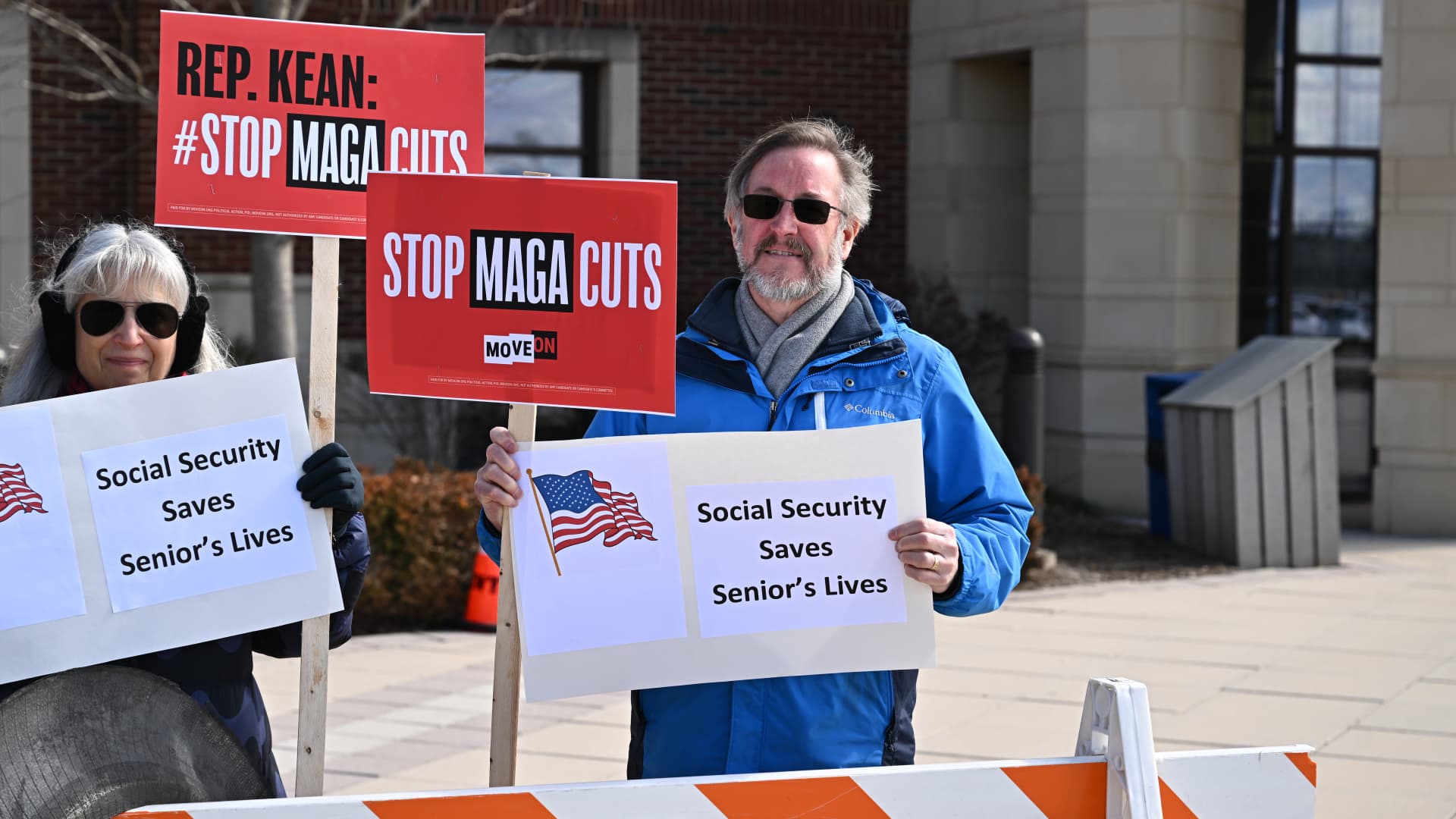Voters who show up at the polls this November may not just be choosing among Republicans, Democrats and third-party tickets — but also casting a vote on the future of Social Security.
Social Security is expected to pay $1.5 trillion in benefits to an average of almost 68 million Americans per month in 2024.
More than half of peak baby boomers — the largest cohort expected to turn 65 by 2030 — are expected to rely primarily on Social Security for income in retirement.
Meanwhile, Social Security’s trust funds are projected to run out in the next decade, which will prompt an across-the-board benefit cut of at least 20% if no changes happen sooner. As Congress weighs that dilemma, they will also decide Social Security’s future role in Americans’ lives.
More from Personal Finance:
Most retirees don’t delay Social Security benefits
Women reaching ‘peak 65’ more likely to struggle in retirement
Americans think they need almost $1.5 million to retire
Democratic lawmakers like Rep. John Larson, D-Conn., who is running for reelection this year, say today’s benefits are not enough.
“Nobody’s getting wealthy on Social Security,” Larson said in a recent interview with CNBC, noting that more than 5 million Americans receive monthly benefit checks that are below the federal poverty level.
“It is the very sustenance that 40% of all Americans need just to get by, and it hasn’t been adjusted in more than 50 years,” Larson said.
‘Why hasn’t Congress voted?’
In 1983, when the last major Social Security reforms were enacted, there were no benefit enhancements, Larson argued. Among the changes put in place at that time was a gradual increase in the retirement age, taxes on benefit income and reduced benefits for public employees with pensions.
For years, Larson has championed a bill — Social Security 2100 — that aims to increase benefits for all beneficiaries by lifting the payroll tax cap for taxpayers earning over $400,000. Today, annual earnings of up to $168,600 are subject to a 6.2% payroll tax toward Social Security paid by both workers and employers. Larson’s plan also calls for closing loopholes that allow wealthy taxpayers to avoid paying Social Security taxes on other income.
Larson said the public is well aware that Social Security benefits are theirs and they’ve paid for them. Yet the same question comes up again and again: “Why hasn’t Congress voted?”
The latest version of Larson’s bill has 184 Democratic co-sponsors yet has never been brought to the House floor for a vote.
Another bill, the Social Security Fairness Act, has even broader support, with 318 co-sponsors from both sides of the aisle, yet that also has yet to be put up for a vote. That proposal tackles just two changes also included in Larson’s bill — repealing the Windfall Elimination Provision and Government Pension Offset rules that limit Social Security benefit income for individuals who receive other benefits like pensions from a state or local government.
Retirement age may be pushed higher
Meanwhile, the Republican Study Committee’s budget, comprising proposals from 192 Republican House members, has suggested changes to Social Security, like raising the retirement age, as it seeks to cut federal spending across the board.
Democrats have called out the more than $1.5 trillion in cuts to Social Security that the Republicans’ proposal may entail.
By raising the retirement age for everyone 59 and younger, Budget Committee Democrats estimate that 257 million people would have to work longer.
The Republican budget proposal has prompted fears that the party could move to enact those changes through a closed-door commission, Nancy Altman, president of advocacy organization Social Security Works, testified before the House Ways and Means Committee last week.
In response, Rep. Drew Ferguson, R-Georgia, who serves as chairman of the House Ways and Means Subcommittee on Social Security, said the committee would not be voting on the Republican budget proposal.
“I have said many times that the only way that this gets solved is in a bipartisan open forum,” said Ferguson during the hearing.
Path to bipartisan compromise uncertain
But how a bipartisan effort should proceed is up for debate.
Larson hopes to bring his Social Security 2100 proposal to the House floor for a vote, betting that some Republicans may come around and back making benefits more generous.
The extra money sent to the nation’s seniors would be spent in their districts, he argued. Moreover, the tax increases would require wealthy individuals to pay what every other working American is already contributing to Social Security, he said.
During last week’s hearing, Rep. Jodey Arrington, R-Texas, said that while he respects Larson’s passion, he still expects it will be necessary for lawmakers to agree on some combination of tax increases and benefit cuts that will affect future beneficiaries.
Experts including Charles Blahous, senior research strategist at the Mercatus Center at George Mason University, agreed.
“The size of the shortfall now is so huge, and so far beyond anything that lawmakers have successfully closed before, the notion that either party can ram through its preferred solution is fanciful,” Blahous said.
Benefits are regularly increased, Blahous argues, through changes to the initial benefit formula and cost-of-living adjustments.
Larson, for his part, has vowed to “never give up, never relent,” when it comes to pushing for his proposal.
Social Security advocates argue that those changes are what people want.
“If you expand Social Security’s benefits … and you pay for it by requiring the uber wealthy to pay their fair share, you will receive widespread praise and the gratitude of the nation,” Altman told members of the House Ways and Means Committee last week.
